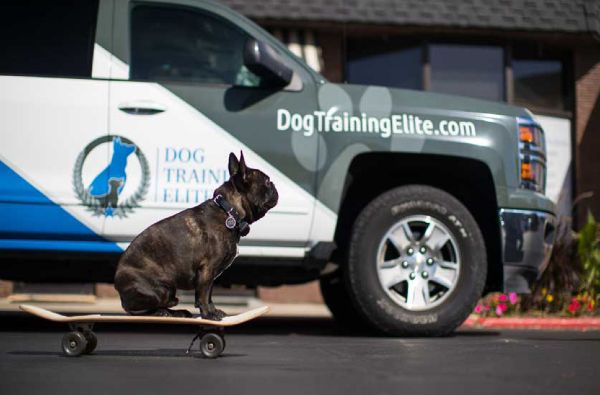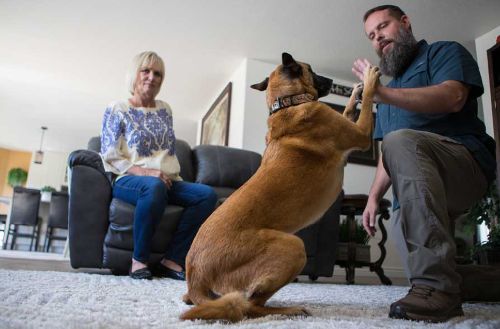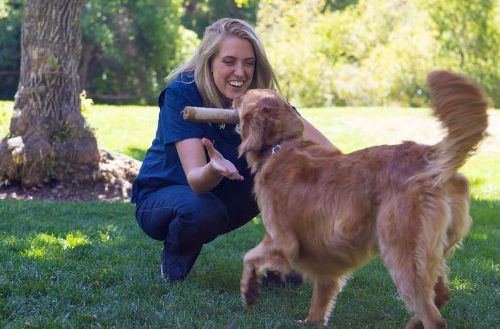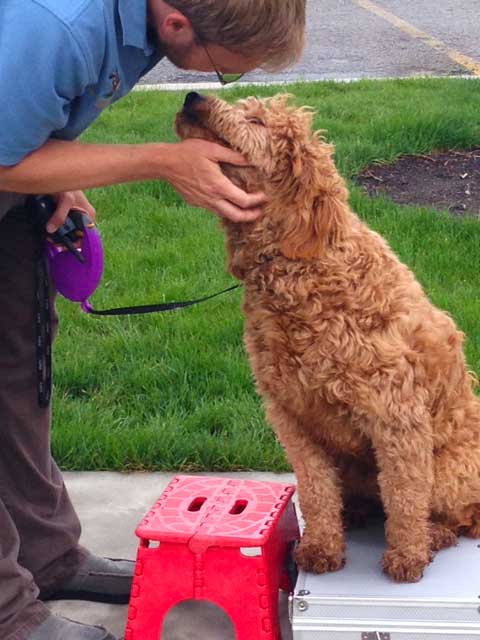Request a Free Assessment

A mobility support dog can increase an individual’s independence and quality of life, a service dog can assist with tasks that are impossible or difficult for their handler to do on their own. A trained brace and mobility service dog can be taken anywhere and is trained to their handler’s specific mobility needs which can include standing, transferring positions, stability assistance, retrieving dropped items, retrieving medication or specific items, ambulatory assistance, recognizing and assisting in emergency situations, alerting others in the home or in public settings in emergencies, pulling a wheelchair for a short distance, opening/closing doors and emotional support.
Mobility support dogs help to increase independence and provide the stability, safety, and support that allows for increased activity and peace of mind. Dog Training Elite’s mobility service dog training program is highly successful as it is personalized and inclusive of the handler and their family. Our programs are set up to produce the best results possible and we have found that training our service dogs alongside their owners in their own home promotes bonding, lasting results, and a positive working relationship.




About Mobility Support Dogs
Most brace and mobility support dogs wear a specially designed harness that allows both the dog and handler to safely and securely work together to provide stable ambulation. Those who could benefit from a service dog specifically trained in brace and mobility support include:
- Those with vertigo and balance disorders often suffer from dizziness and are often unstable when walking. A mobility and brace support dog can help orient, ground, and stabilize their handler as they ambulate.
- Many physical disabilities such as cerebral palsy, MS, spina bifida or back injuries can lead to irregularities in balance, gait, stability and ambulation. Mobile support dogs provide stability and counterbalance support which can allow their handler to walk safely with assistance.
- Some medications or disabilities have adverse side effects that can impair alertness and the ability to safely walk and respond to emergencies. A service dog can be trained to help navigate a disoriented handler through both regular daily activities and emergency situations.
- Those who have health risks that cause unconsciousness can benefit from a trained service dog that can retrieve help, call emergency services on a special phone, and reposition their handler if they are unable to breathe.
- Muscle dystrophy disorders, strokes, and many other conditions can reduce one’s strength, coordination, stability, and ability to complete simple tasks such as opening drawers or reaching light switches. A mobility service dog can complete simple daily tasks that are difficult for their handler to accomplish due to their diminished mobility.

Our Balanced Theory
We base our training around the "Classical Conditioning" model (a.k.a. "Pavlovian" or "respondent conditioning"). This includes developing conditioned or automatic reflexes to commands. In its simplest form (after proper conditioning), when the owner says "sit," the dog automatically sits without thinking about it. Our unique techniques ensure our program is a success no matter what behavior we encounter.
-
Empowering Owners
We empower Owners to train so their dog knows who to obey at all times. -
Personalized
We deal with problem behaviors on a personal basis. -
Environment Specific
We train wherever issues tend to arise (i.e. jogging, park, home).
-
Supportive
We support Owners in the off-hours (when training is "not in session"). -
Involved
We work with all members of the household. -
Simplified & Customized
We plan training around the owner's schedule and require only 20 min/day follow-up practice.
-
Continued Training
Additional programs / group sessions offered after in-home training. -
Lifetime Investment
We follow up & are invested in the owner's success long-term. -
Satisfaction Ratings
Our high client satisfaction rating sets us apart from competitors.
clas·si·cal con·di·tion·ing
PSYCHOLOGY
noun
A learning process that occurs when two stimuli are repeatedly paired; a response that is at first elicited by the second stimulus and is eventually elicited by the first stimulus alone.
We help your dog become a valued companion and beloved member of the family. Read what our customers have to say and then give us a call!
Follow up 6 months later-Reggie had some continued training to learn to fetch things for his girl, and is absolutely incredible at it thanks to Evan and his team!..We also took a trip to Florida with Reggie. First flight with him, Disney World, and Universal Studios for ten days straight. He did absolutely remarkable, and most people didn’t even realize we had a dog with us until they noticed his Minnie ears. He was able to ride several rides with his girl, and did incredible! Elite dog training is the absolute best of the best!!! We have a service dog for my 9 year old, and between Evan, and Kaycee I couldn’t ask for better people to work with! They have gone absolutely above and beyond to help our pup do any, and everything possible to help our daughter live the most independent life despite her chronic health problems. The amount of time, and work they have put into Reggie these last two years is astounding. Because of them Reggie is able to spend countless weeks in the hospital with my 9 year old, he goes to school with her everyday, and goes everywhere she goes. He is by far the best dog ever because of the incredible people at Elite. You can absolutely tell the people at Elite love what they do! 5 stars is not enough to describe what an incredible company this is!! We LOVE Utah County Elite dog trainers!!— Karissa Illu
Posted April 1st 2024
Very professional and listens to your concerns. Their work is amazing!— Diane Foster
Posted October 20th 2024
Worth every penny, and I should have signed up for dog training sooner. The whole crew at DTE are knowledgable, kind, and took the time to customize a training program for my unique situation and even individualized between my two dogs. I am so pleased! Thanks Jeff, Dallin, McCall & Oakley! You have been a game changer in my releationship with my dogs.— Heather Martinez
Posted October 20th 2024
Always great to work with Dallin! He gives great advice and is good at demonstrating how to train your pup. Dallin’s the best!— Rebecca Williams
Posted October 18th 2024
We did the platinum package that included 2 weeks of day camp, along with private lessons and group classes. We’ve been impressed with all of the individualized advice and direction we’ve gotten from DTE. And all the trainers are extremely enthusiastic and knowledgeable. I was pretty blown away by the change we saw after just the first week. Our girl Stevie still has some growing to do, but I feel that we have the tools to meet our goals. Stevie was a reactive shelter dog that is quickly growing into a confident, playful, well-adjusted girl.— Ally Cirenza
Posted October 15th 2024
Dallin is amazing! Giveg my family and I many different ways of handling our dog. It is amazing 👏— Ronald Taylor
Posted October 1st 2024
All of the staff are amazing! I have been working mostly with Jeff and Oakley, but everyone there knows about my dog and his progress, and are always ready and willing to answer my questions and help us on our training journey. They offer a wide variety of in home and studio classes, and personalize your training to fit your dog’s needs. I highly recommend them.— Marial Clark
Posted October 14th 2024
My experience so far has been amazing. I’m beyond happy with Deidre Wilson! She has been amazing with my Doberman and has such a natural connection with my entire pack. Deidre is not only talented but also takes the time to explain everything, educating me and giving me the confidence to succeed with my Doberman. I couldn’t ask for a better dog trainer! Kaycee is also fantastic, always patient and flexible with our schedule, making the entire experience seamless. I highly recommend them both and their staff.— Karen Delgado
Posted October 11th 2024
Dallin was great! He was on time and has awesome energy. My puppy loves him! He gave me some very useful tips on correcting jumping and button training my puppy. He is also very knowledgeable and explains behaviors in a very easy to understand way.— Sondra Fern
Posted October 6th 2024
Deidre showed up for our initial consultation and immediately made me feel confident in her, and DTE’s, training and knowledge! She is kind, calm, educated, and very patient! We cannot wait to have her start training our puppy!— Gabe N
Posted October 9th 2024
Jeff & Dallin are absolutely awesome!!! McCall is great too. We really loved all of the training for both of our girls and they are sk well behaved now. Always we recommend dog training elite. 💪❤️🐶🐕— Benjamin Dara
Posted October 9th 2024
I have had a great time working with DTE-NU and looking forward to continue working with them. Not only have they done amazing with training and service, they also are very understanding and flexible. I went through a rough financial situation and they were kind enough to work with me with no penalties. It literally made a WORLD of difference in a very stressful part of my life. I have a very well trained service pup all thanks to them.— McKell Rushton
Posted October 8th 2024
Gosia and Michael Billedo of Dog Training Elite-Northeast clearly love dogs and love what they do. They are patient and disciplined trainers who know how to read both the dog and the dog owner to suggest what will help the dog to master all the commands. I recommend them without qualification to anyone who wants to enjoy the peace of mind of having your dog comply with commands.— Jane Fahey
Posted October 8th 2024
This has been the absolute best experience. Deidre was incredible. She made me and my dog feel do comfortable.— Samantha Rasmussen
Posted September 18th 2024
Excellent personalized training. We loved working with this team, and our dog made great progress.— Kristen Jensen
Posted October 5th 2024
Deidre is knowledgeable, patient and kind. She is a professional and one who certainly knows her craft. Our dog took to her guidance and direction, with little complaint. Deidre is confident; it is obvious that she likes what she does. It shows in her enthusiasm and her ability to teach.— Lucy Herrera
Posted October 4th 2024
Dallin was amazing AGAIN. He explains things, encourages good work, and always works at my pace. So helpful for me as a mobility challenged human and my service dog in training. I absolutely LOVE Elite Dog Training and the fine outstanding trainers. 10 stars every time.— Meggie Thiessens
Posted October 4th 2024
Trainers are great! I'm really impressed with the training and respect they show to both me and Harley. Very happy and Planning to start my other dog on training with them.— Ann Garcia
Posted October 4th 2024